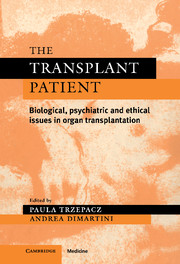Book contents
- Frontmatter
- Contents
- List of contributors
- Preface
- 1 The mystique of transplantation: biologic and psychiatric considerations
- 2 Psychosocial screening and selection of candidates for organ transplantation
- 3 Psychosocial issues in living organ donation
- 4 Quality of life in organ transplantation: effects on adult recipients and their families
- 5 Quality of life of geriatric patients following transplantation: short- and long-term outcomes
- 6 Cognitive assessment in organ transplantation
- 7 Pharmacologic issues in organ transplantation: psychopharmacology and neuropsychiatric medication side effects
- 8 Alcoholism and organ transplantation
- 9 Ethics and images in organ transplantation
- 10 Psychoneuroimmunology and organ transplantation: theory and practice
- 11 Pediatric transplantation
- 12 Current trends and new developments in transplantation
- Index
5 - Quality of life of geriatric patients following transplantation: short- and long-term outcomes
Published online by Cambridge University Press: 14 September 2009
- Frontmatter
- Contents
- List of contributors
- Preface
- 1 The mystique of transplantation: biologic and psychiatric considerations
- 2 Psychosocial screening and selection of candidates for organ transplantation
- 3 Psychosocial issues in living organ donation
- 4 Quality of life in organ transplantation: effects on adult recipients and their families
- 5 Quality of life of geriatric patients following transplantation: short- and long-term outcomes
- 6 Cognitive assessment in organ transplantation
- 7 Pharmacologic issues in organ transplantation: psychopharmacology and neuropsychiatric medication side effects
- 8 Alcoholism and organ transplantation
- 9 Ethics and images in organ transplantation
- 10 Psychoneuroimmunology and organ transplantation: theory and practice
- 11 Pediatric transplantation
- 12 Current trends and new developments in transplantation
- Index
Summary
Introduction
In recent years there has been a considerable increase in the size of the elderly population (i.e., those over 64 years of age) in the USA, with this trend expected to continue into the twenty–first century (Anand et al. 1990). From 1900 to 1990, the number of elderly American citizens increased 10-fold, rising from 3.1 million to 31.4 million, and their proportion of the total population has tripled, rising from 4.1% to 12.6%. By 1996, 20% of the US population was older than 65 years of age (Latos 1996), while in developed countries overall those aged 65 or older make up 14% of the population (Gelbard, Haub, and Kent 1999). US men who survive to age 65 can expect to live another 16 years on average; US women who are age 65 can expect to live another 19 years (Gelbard et al. 1999).
The aging of the population will play an important and controversial role in the distribution and provision of health resources. On the one hand, the existing discrepancy between the percentage of elderly in the population and the high proportion of health care resources that they consume (Rowe, Grossman, and Bond 1987) will contribute to an increase in health care spending (Chelluri et al. 1993). On the other hand, the lack of information about the influence of age on outcomes suggests the need to readdress using age as a criterion for efficient distribution of health care resources (Callahan 1987; Veatch 1988; Hunt 1993).
- Type
- Chapter
- Information
- The Transplant PatientBiological, Psychiatric and Ethical Issues in Organ Transplantation, pp. 146 - 163Publisher: Cambridge University PressPrint publication year: 2000
- 1
- Cited by



